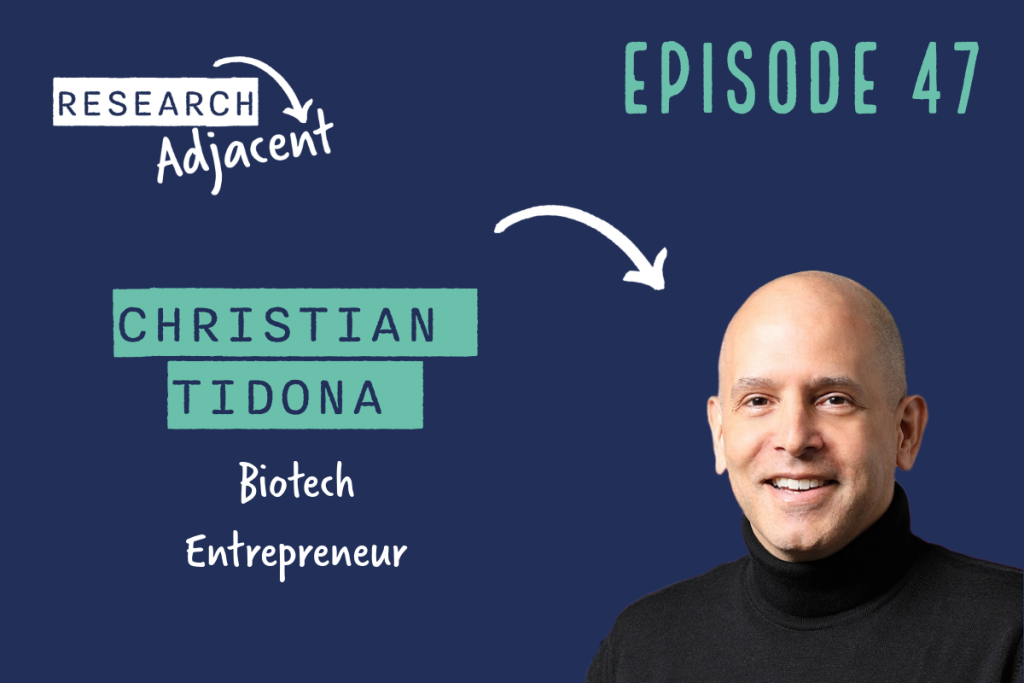Christian Tidona, Biotech Entrepreneur (Episode 47) | Christian unites industry and academia to tackle big health challenges

For this episode of the Research Adjacent podcast Sarah is talking to biotech entrepreneur Christian Tidona. Christian is the founder and Managing Director of the BioMed X Institute in Heidelberg, Germany.
The BioMed X Institute bridges academia and industry to create real-world solutions for big future health questions in topics like cancer or neuroscience. BioMed X sources industry funding then recruits early career researchers with creative ideas to work on these challenges. They started in Heidelberg, but have since expanded bringing their model to the USA and Israel.
Both a scientist and an entrepreneur
Christian is a serial entrepreneur who started his first company straight after completing a PhD in virology. Unhappy with the politics of academic life, he considered a move into publishing, but his mentor advised he should ‘do something proper with his time’ and start a company.
“I have two hearts in my chest, one of a scientist and one of an entrepreneur.”
Biomed X is not his first venture. His first company, a blood-based diagnostics company, had lofty goals but ultimately failed. But Christian was able to take that learning into subsequent ventures and ultimately Biomed X which has now operated for over 10 years.
“Your currency in the university is publications. Once you’re in the startup, cash flow is the most important thing you need to deal with. And understanding the basics of legal, because you have to sign agreements and you need advisors and partners not to make all of those mistakes.”
Remarkably Christian has built BioMed X up without any external investment which gives them both freedom and stability. Christian is now both the owner and the Managing Director. On a practical level it means he handles everything from high-level strategic decisions to day-to-day problem solving.
“I’m the guardian of everybody’s time and making sure everybody can spend their time as creatively as possible.”
Mentors and mentoring
Christian takes his role as a mentor to the researchers at the Institute very seriously. This is because he has benefited hugely from mentorship in his own life. Many of these mentors were found through serendipity. Christian recounts how he met entrepreneur and mentor Ashok Rao at a conference.
“I managed to get close to him when we were moving from one lecture hall to the other lecture hall. And I said, I really enjoyed your presentation and this is what I learned from it. And by the way, your shoelace is broken. His shoelace was broken. So I ran into a shoemaker shop and bought him a shoelace. And we became very close friends. This is a story he’s still telling today.”
Part of the recruitment process for BioMed X scholars is an intense week-long bootcamp which helps applicants shape their proposal. Christian sees this as an opportunity to mentor the next generation.
“In our boot camps we always teach our three core values which are helping the next generation to be a nicer and better researcher, human being and creating impact. That’s the best thing you can do as a as a scientist and as a human being.”
Education and opportunities
This commitment to mentoring extends beyond the people who make their way into BioMed X to the world beyond. He would love to improve scientific education around the globe and create opportunities for young people to learn from different cultures and belief systems to help foster understanding and peace.
“Talent is distributed evenly across the globe, but the ability to develop the talent is not.”
It is perhaps no surprise that Christian’s advice to anyone considering a similar path is to find supportive mentors who can help to develop that talent.
Find out more
- Connect with Christian on LinkedIn
- Find out about the BioMed X Institute
- If you enjoyed this episode you might also like the Academic Adventures podcast
Theme music by Lemon Music Studios from Pixabay